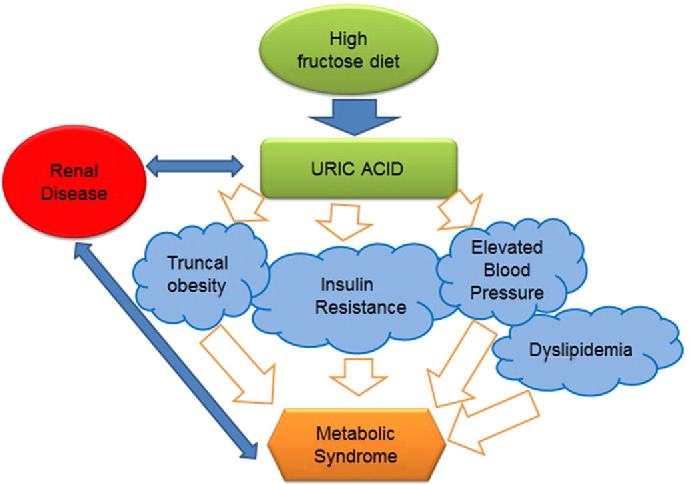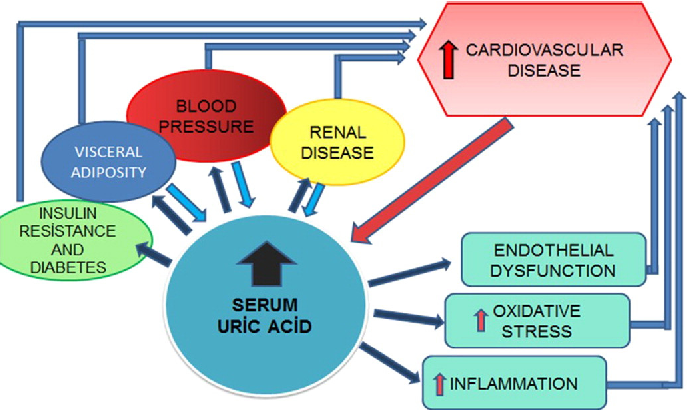Elevation of blood Uric acid levels is now considered as the key to the development of metabolic syndrome, particularly cardiovascular disease, hypertension and inflammatory status. In recent years, it is becoming clearer that elevation of uric acid is linked to the consumption of fructose in various food types, and therefore, dietary restriction plays a very important role in regulating serum uric acid and the problems associated with its elevation.


Kanbay M, Jensen T, Solak Y, Le M, Roncal-Jimenez C, Rivard C, Lanaspa MA, Nakagawa T, Johnson RJ. Uric acid in metabolic syndrome: From an innocent bystander to a central player. Eur J Intern Med. 2016 Apr;29:3-8. doi: 10.1016/j.ejim.2015.11.026.Available at https://www.ncbi.nlm.nih.gov/pmc/articles/pmid/26703429/
Fructose Worsens Gout: Consumption of soft drinks sweetened with sugar and fructose is strongly associated with an increased risk for gout, according to the results of a prospective cohort study reported in the February 1 Online First issue of the BMJ. This was a 12-year follow-up study of 46,393 health professionals without a previous history of gout and the goal was to assess the relationship between consumption of sugar-sweetened soft drinks and fructose and the risk for incident gout. See Sweet Soft Drinks, Fructose Linked to Increased Risk for Gout. Available at http://www.medscape.com/viewarticle/569656
Raina S, Raina RK, Raina SK. Hyperuricemia: A risk factor beyond gout. J Obes Metab Res 2015;2:228-33. Available from: https://www.jomrjournal.org/text.asp?2015/2/4/228/170903
Jamnik J, Rehman S, Blanco Mejia S, et al. Fructose intake and risk of gout and hyperuricemia: a systematic review and meta-analysis of prospective cohort studies. BMJ Open. 2016;6(10):e013191. Published 2016 Oct 3. doi:10.1136/bmjopen-2016-013191. Available at https://www.ncbi.nlm.nih.gov/pmc/articles/PMC5073537/
Lecoultre V, Egli L, Theytaz F, Despland C, Schneiter P, Tappy L. Fructose-induced hyperuricemia is associated with a decreased renal uric acid excretion in humans. Diabetes Care. 2013;36(9):e149-e150. doi:10.2337/dc13-0866. Available at https://www.ncbi.nlm.nih.gov/pmc/articles/PMC3747900/
Sayehmiri K, Ahmadi I, Anvari E. Fructose Feeding and Hyperuricemia: a Systematic Review and Meta-Analysis. Clinical Nutrition Research. April 2020;9(2):122. DOI: 10.7762/cnr.2020.9.2.122 Available at https://www.researchgate.net/publication/341024202_Fructose_Feeding_and_Hyperuricemia_a_Systematic_Review_and_Meta-Analysis/fulltext/5ea97cff299bf18b9584ac4e/Fructose-Feeding-and-Hyperuricemia-a-Systematic-Review-and-Meta-Analysis.pdf
Nakagawa T, Hu H, Zharikov S, et al. A causal role for uric acid in fructose-induced metabolic syndrome. American Journal of Physiology-Renal Physiology. 2006;290(3):F625-F631. Available at https://journals.physiology.org/doi/abs/10.1152/ajprenal.00140.2005
